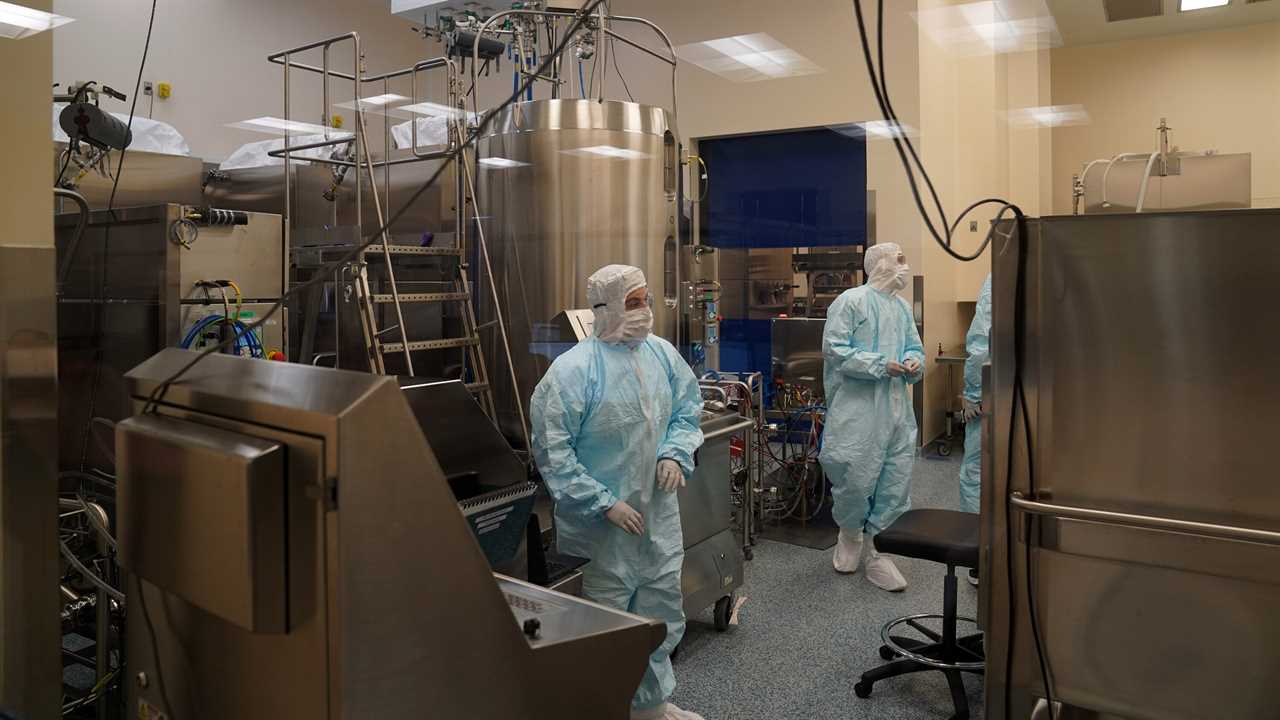
WASHINGTON — Tens of millions of doses of the coronavirus vaccine made by the British-Swedish company AstraZeneca are sitting idly in American manufacturing facilities, awaiting results from its U.S. clinical trial while countries that have authorized its use beg for access.
The fate of those doses of AstraZeneca’s vaccine is the subject of an intense debate among White House and federal health officials, with some arguing the administration should let them go abroad where they are desperately needed while others are not ready to relinquish them, according to senior administration officials.
AstraZeneca is involved in those conversations.
“We understand other governments may have reached out to the U.S. government about donation of AstraZeneca doses, and we’ve asked the U.S. government to give thoughtful consideration to these requests,” said Gonzalo Viña, a spokesman for AstraZeneca.
About 30 million doses are currently bottled at AstraZeneca’s facility in West Chester, Ohio, which handles “fill-finish,” the final phase of the manufacturing process during which the vaccine is placed in vials, one official with knowledge of the stockpile said.
Emergent BioSolutions, a company in Maryland that AstraZeneca has contracted to manufacture its vaccine in the United States, has also produced enough vaccine in Baltimore for tens of millions more doses once it is filled into vials and packaged, the official said.
But although AstraZeneca’s vaccine is already authorized in more than 70 countries, according to a company spokesman, its U.S. clinical trial has not yet reported results, and the company has not applied to the Food and Drug Administration for emergency use authorization. AstraZeneca has asked the Biden administration to let it loan American doses to the European Union, where it has fallen short of its original supply commitments and where the vaccination campaign has stumbled badly.
The administration, for now, has denied the request, one official said.
Some federal officials have pushed the White House to make a decision in the next few weeks. Officials have discussed sending doses to the European Union, Britain and Brazil, all hard hit by a worsening coronavirus crisis.
“If those donation actions were to proceed, we would seek guidance from the U.S. government on replacement of doses for use in the U.S.,” Mr. Viña said.
The White House did not respond to a request for comment.
The administration’s hesitation is at least partly related to uncertainties with vaccine supply before a benchmark of late May laid down by President Biden when he promised enough vaccine doses to cover every adult in the United States. Vaccine production is notoriously complex and delicate, and problems like mold growth can interrupt a plant’s progress.
Last May, the Trump administration pledged up to $1.2 billion to AstraZeneca to finance the development and manufacturing of its vaccine, which it developed with the University of Oxford, and to supply the United States with 300 million doses if it proved effective. Federal officials and public health experts last year viewed the vaccine, which is less expensive and easier to store for long periods than some other vaccines, as most likely to be among the first to receive authorization.
That never happened, in part because of a pattern of communication blunders by AstraZeneca that weakened the company’s relationship with American regulators and slowed the vaccine’s development. Last fall, AstraZeneca’s trial in the United States — the same one that will soon report results — was grounded for nearly seven weeks because the company was slow to provide the F.D.A. with evidence that the vaccine had not caused serious neurological side effects in two volunteers.
The company is now grappling with another safety scare. Acting out of precaution, health authorities in Denmark, Norway and Iceland suspended use of the AstraZeneca’s vaccine on Thursday after several reports across the continent of severe blood clots.
European official and the company said there was not evidence of any causal link. In the vast majority of cases, the emergence of such medical conditions has nothing to do with the vaccine. Some percentage of people are expected to fall ill by chance after getting vaccinated, as would happen in any group of people.
Latest Updates
- The pandemic’s disruption of birth control access led to 1.4 million unplanned pregnancies, study says.
- Here’s how to watch Biden’s first prime-time speech.
- A case cluster at a popular gym roils Hong Kong’s banks and international schools.
AstraZeneca has also run into other problems as its vaccine has rolled out. The shortfall in supply has fueled tensions with European officials. Some people in Germany and other countries have balked at taking the vaccine, for fear it is second-class because of its lower overall efficacy in clinical trials compared with the vaccine from Pfizer. South Africa last month halted its plans to introduce the vaccine after a small clinical trial found that the vaccine did not appear to be protective against mild to moderate illness caused by a concerning coronavirus variant first seen there.
In the United States, the Biden administration’s moves to order more supply of the three vaccines authorized by the F.D.A. has further sidelined AstraZeneca’s candidate. The United States may only briefly, or never, need the AstraZeneca doses if they are cleared for emergency use.
“If we have a surplus, we’re going to share it with the rest of the world,” Mr. Biden told reporters on Wednesday, speaking generally about the U.S. vaccine supply. “We’re going to start off making sure Americans are taken care of first.”
Johnson & Johnson, which has authorization for its vaccine in the United States but fell behind on its production targets in both the United States and Europe, recently asked the United States to loan 10 million doses to the European Union, but the Biden administration also denied that request, according to American and European officials.






